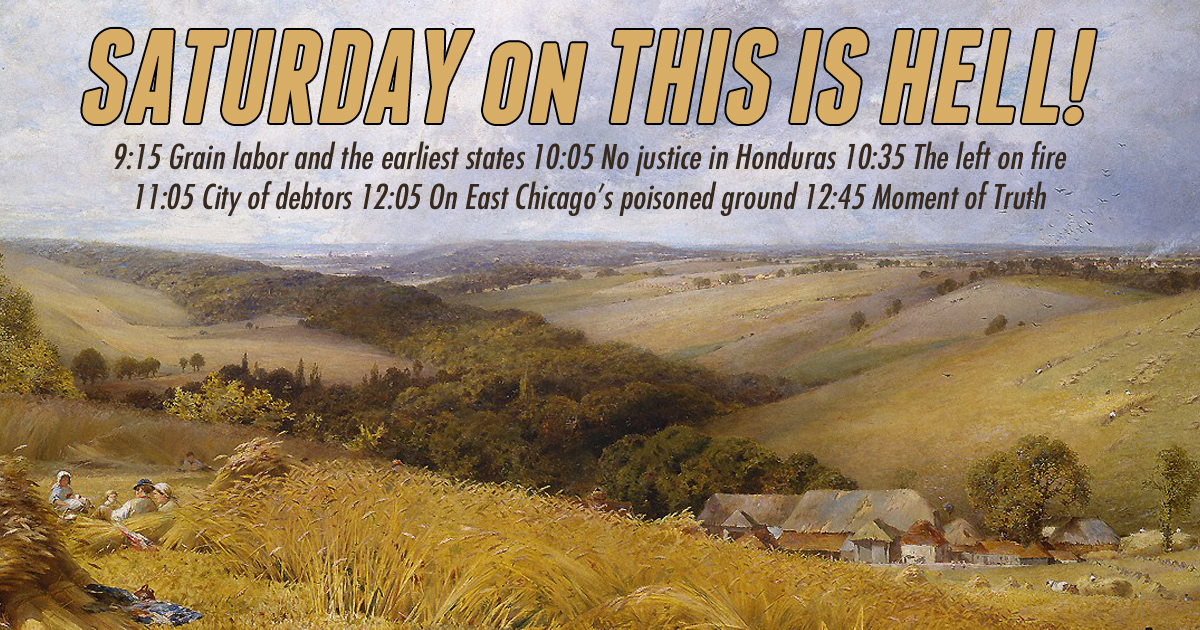Listen live from 9AM - 1:00PM Central on WNUR 89.3FM / stream at www.thisishell.com / subscribe to the podcast
9:15 - Author Liz Fekete sees the far right not fighting against the European state, but working within it.
Liz is author of Europe’s Fault Lines: Racism and the Rise of the Right from Verso.
10:05 - Jacobin writer Meagan Day dismantles means testing, incrementalism and other fixtures of neoliberalism.
Meagan wrote the recent articles The Bureaucratic Nightmare of Incrementalism and Targeted Social Programs Make Easy Targets for Jacobin.
10:35 - The Radical Pessimist, Kevan Harris examines the labor roots of Iran's revolt of the periphery.
Kevan co-authored the report Voter Behaviour and Political Mobilization in Iran for EIRG and co-wrote the article How years of increasing labor unrest signaled Iran’s latest protest wave for Washington Post.
11:05 - Political economist Gordon Lafer explains how corporate politics bought America, state by state.
Gordon is author of The One Percent Solution: How Corporations Are Remaking America One State at a Time from Cornell University Press.
12:05 - Historian Terence Keel explores the pre-modern Christian origins of modern racial thought.
Terence is author of Divine Variations: How Christian Thought Became Racial Science from Stanford University Press.
12:45 - In a Moment of Truth, Jeff Dorchen envisions the future for humanity that will suit him.
Jeff's movie comes out next month. He wrote it!
Welcome to the Moment of Truth: the thirst that is the drink.
Jeff Dorchen is damp. Not even sure how to go about carving into this nonsense. Shirthole countries. Did you hear about Donald Dump's complaint about shirthole countries? The racism, the colonial, imperial, capitalist disdain and hatred. He really needs to find his fat face at the end of a swinging baseball bat. He needs a dentist, a dentist who uses only baseball bats. That's the fever talking. Delirium. And with the heartburn. For days I've eaten nothing but a few select oddities. A dozen roasted potatoes. A plain bagel. A cookie. A pizza. Plain green beans. A pear. Chicken soup. Blueberry pancakes. Ginger beer. A varied diet, but somehow it hasn't nourished me.
The temperature changes radically, moment to moment. The pillow is hot, the air is cold, the blankets are hot, the sheets are cold. The head is thick and full of fuzz. In the parking garage of Trader Joe's, where I'd gone to get ginger beer, a customer was doing a noisy but conscientious job of collecting errant shopping carts and bringing them to the cart corral. I passed her just as she completed her task. "Damn," I said, "You really earned that free parking!"
Shirthole countries! Y'know, I'm in no condition to pick apart this event, but I don't know if there'll be a future. Dump. A sizable amount of people on Earth considered him the worst sort of human being, decades ago. I don't believe he's won any converts since then, he's just fattened up the ones he already had. It's just not nice, that's what it isn't. For a president to say about people's homes. Shirtholes.
This may be the delirium talking, but isn't it safe to say that we've never elected to the presidency the best person for the job? Think about it. The actual best person to be President of the United States, the person who could delegate and diplomatize, be an inspirational figurehead, guide the economy to a sustainable course – that person is probably too old or young or female or transsexual or bald or black or deaf or queer or Buddhist to even enter the running. We've never elected the best person to be president because the process is designed to prevent the best person from even running. We're not looking for the best person. We're looking for someone who can convince the largest number of people that they're the best person. We're looking for a con artist. And boy, are we ever... read more
Listen live from 9AM - 1:00PM Central on WNUR 89.3FM / stream at www.thisishell.com / subscribe to the podcast
9:15 - Anthropologist James C. Scott explores the politics of accumulation in the earliest agrarian states.
James is author of Against the Grain: A Deep History of the Earliest States from Yale University Press.
10:05 - Journalist Sarah Kinosian reports on state violence and US silence after Honduras's disputed election.
Sarah wrote the articles Families fear no justice for victims as 31 die in Honduras post-election violence and US recognizes re-election of Honduras president despite fraud allegations for The Guardian.
10:35 - Correspondent Ed Sutton watches the left run out the clock fighting itself while the world runs out of time.
Ex-expat Ed has been back in the US for a year now, running the highly recommended site Antidote Zine.
11:05 - Law scholar Anne Fleming examines the shifting intersection of lenders, debtors and the welfare state.
Anne is author of City of Debtors: A Century of Fringe Finance from Harvard University Press.
12:05 - Investigative reporter Rebecca Burns surveys the toxic legacy of lead pollution in East Chicago.
Rebecca wrote the article On Poisoned Ground: East Chicago’s legacy of lead pollution for The Baffler.
Welcome to the Moment of Truth, the thirst that is the drink.
Well, it's happening. The days are starting to get longer. More daylight time for me to fritter away, thumbing my nose at our rapidly degrading society and its sadistic norms. Yeah, I've got a bad attitude. Cuz, friends, our society runs on pure bullshit, and everyone knows it. But that's no reason to operate a mediocre restaurant. Well, maybe it is.
Maybe our society's current completely ass-upside-down arrangement of priorities is a reason to serve mushy falafel with watery tahini. The privatization of nature, the draining of wealth from working-class communities, and the poisoning of our air, soil and water, just might justify serving harrisa seemingly flavored with a hint of Murphy's Oil Soap. I'm not a chef, I'm not a restaurant manager, I'm not even a food saboteur, so I don't know what-all goes into making such decisions.
Our nation's systemic impoverishment of its elders and its children is an international scandal, as is our substandard health care system, and our underfunded public education system, if it can even be called a system, as fragmentary and haphazard a jalopy as it is. I'd think a restaurant would take the opportunity to provide food to their patrons of an enjoyable nature, given how parsimoniously joy is being distributed these days. Is now really the best time to overcook chicken shwarma till its texture is that of cork paneling? Surely now is the least opportune moment for serving dry shwarma, which can only exacerbate a diner's sorrow rather than relieve it.
Lentils should be cooked, of course, but a bit of resistance is desirable. They aren't rolled oats, for crying out loud. A lentil salad shouldn't be slurpable, like a milkshake. And serving them thus is no way to take my mind off Donald Dump's spastic narcissism, or Ajit Pai's perverse misguidance of the FCC, or Betsy DeVos's uneducated leadership of the Department of Education. I'm not telling you how to run your business. I'm not a businessperson. I'm only expressing what countless patrons are probably thinking.
They're thinking, "This food is only making us more dissatisfied. This food is monstrous. This food is corrupt as all hell. This food is the opposite of food, the way Supreme Court Justice Neil Gorsuch is neither supreme, nor courtly, nor just."
What's with the tiny plastic bowl-shaped micro-vessel for pickle? Where did you find these, is there a store that... read more
Listen live from 9AM - 1:00PM Central on WNUR 89.3FM / stream at www.thisishell.com / subscribe to the podcast
9:15 - Philosopher Tim Crane explains what atheists miss when they view religion from the outside.
Tim is author of The Meaning of Belief: Religion from an Atheist’s Point of View from Harvard University Press.
10:05 - Historian Keri Leigh Merritt examines the labor of poor whites living outside slavery in the Antebellum South.
Keri Leigh is author of Masterless Men: Poor Whites and Slavery in the Antebellum South from Cambridge University Press.
11:05 - Historian Judith Flanders explores the populist, adaptive, multi-purpose, meaning of Christmas.
Judith is author of Christmas: A Biography from MacMillan.
12:05 - The Hopleaf's Michael Roper reviews the year in craft beer capitalism, and the year to come.
Michael is owner of Chicago's The Hopleaf Bar, in its 25th year. Try the Bitterballen.
12:45 - In a Moment of Truth, Jeff Dorchen discusses The Socialist Leisure Work Ethic and the Spirit of Falafel.
He's talked about Socialist Leisure before, but this falafel thing is definitely a new development in his ideology.








